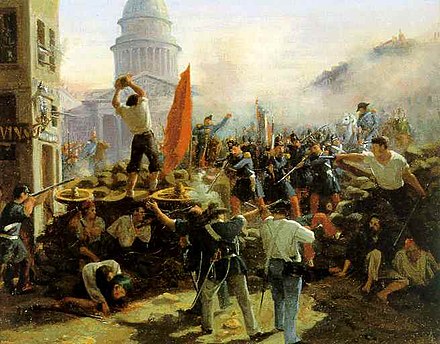Today in Labor History June 23, 1611: Henry Hudson’s crew mutinied and set him adrift in the Hudson Bay. No one ever saw or heard from him again. He was trying to find the fabled Northwest Passage through the arctic circle to China. Conditions were terrible. It was freezing. They were running out of food and supplies. The crew wanted to return home. Hudson wanted to keep going, seeking something no one was sure existed. It was a classic example of workers rising up against unfair and dangerous treatment. They saved their lives in the process. However, the authorities arrested them upon their return to England.
1800s

Today in Labor History June 23, 1848: Workers rose up in Paris. The rebellion lasted until the 26th. They were rebelling against plans to close the National Workshops. The Second Republic created the Workshops to provide work and income for the unemployed. The National Guard killed up to 10,000 people. They deported another 4,000 to Algeria.
Today in Writing History June 23, 1868: Christopher Latham Sholes received a patent for his invention: the “Type-Writer.” Side note: in middle school, the principal suspended me for removing the carriage from my typewriter. I swapped with my buddy, who had a slightly different model. As a result, it broke his typewriter. It brought terrible shame to my family.
Today in Labor History, June 23, 1894: Alfred Kinsey was born. He was an entomologist and sexologist, not necessarily in that order.
1910s-1940s
Today in Labor History June 23, 1914: Pancho Villa took Zacatecas from Victoriano Huertas in the Battle of Doiran.
Today in Labor History June 23, 1947: Congress passed the anti-worker Taft-Hartley Act, overriding President Harry Truman’s veto. The act rolled back many of the labor protections created by the 1935 Wagner Act. Taft-Hartley weakened unions in numerous ways, including the banning of the general strike. It also allowed states to exempt themselves from union requirements. Twenty states immediately enacted anti-union open shop laws.
1960s-1970s
Today in Labor History June 23, 1966: Race riots began in Cleveland, Ohio and continued for a month.
Today in Labor History June 23, 1972: Congress amended Title IX of the United States Civil Rights Act of 1964. It now prohibited sexual discrimination to any educational program receiving federal funds. As a result, there has been a huge increase in girls’ athletic programs in high schools and colleges. This, in turn, has led to increases in professional women athletes. It is probably one of the reasons why the U.S. has been able to produce so many top-level women soccer players and dominate women’s soccer for the past 20 years. Now, if the U.S. soccer federation would just pay the women athletes the same as the male athletes. Hell, they ought to get paid a lot more. They’ve been far more successful than the U.S. men’s soccer team. The World Surf League has been paying female and male athletes the same amount for three years now.


Pingback: Today in Labor History November 24 - Michael Dunn